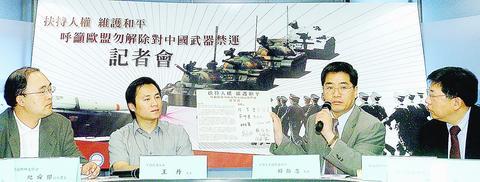As the EU prepares to discuss lifting its arms embargo on China in the coming months, academics and think tanks made a joint statement yesterday urging the EU not to make a move that may disrupt peace and stability in the Asia-Pacific region.
At a seminar hosted by the Taiwan Thinktank and the European Union Study Association-Taiwan, Wang Dan (王丹), a student leader during the 1989 Tiananmen Square demonstrations, pointed out that China's human rights record has not improved in the 15 years since its brutal repression of the democratic movement.

PHOTO: YEH CHIH-MING, TAIPEI TIMES
The EU imposed the arms embargo in 1989 as a sanction against the Chinese government's clampdown on pro-democracy demonstrators.
"Over these years, China's human rights record has not improved. Instead, it may have become worse," Wang said.
The EU has been deceived if it believes it can lift the embargo because the Chinese authorities respect human rights better now, he said.
"Fifteen years have passed since the Tiananmen Square movement. The Chinese government has not compensated or apologized to the victims. It even banned discussion on the event," Wang said.
He cited the example of Jiang Yanyong (蔣彥永), the Chinese surgeon who exposed China's SARS cover-up. He was jailed because he released a letter pressing China's Communist Party leaders to admit that the Tiananmen Square Massacre was wrong.
It is also distressing that the Chinese authorities continue to prohibit families of victims of the massacre from publicly mourning for their loved ones, he said.
"Is this a humane government?" Wang asked.
Wang, currently in exile, said many Chinese democracy activists in the US missed home and longed to return to China. He said one of his friends who is dying has not given up hope of going home and has been pleading with Chinese officials to allow him to return.
"Some have perished abroad without being able to see their families for the last time. Can we say such a government's human rights record has improved?" Wang said.
Wang added that French President Jacques Chirac, a main backer of lifting the EU arms embargo, has ignored oppression of human rights in China.
"The French Revolution greatly inspired us who pursued democracy in China and initiated the Tiananmen Square movement. Now we are very disappointed," he said.
Lin Cheng-yi (林正義), a research fellow at Academia Sinica, urged the legislature to pass a resolution to express Taiwan's opposition to the EU lifting the ban and awaken the Taiwanese people's awareness of the seriousness of the move.
If the ban is removed, the EU will be able to sell weapons to China, which threatens to use force against Taiwan if the latter seeks independence.
The EU, in deciding whether to lift the embargo, has to take the positions of the US and Japan into account, Lin said.
Lin, a former senior advisor to the National Security Council, called on the EU to reconsider its "Code of conduct on arms exports," which states that the issuing of export licenses for arms should be halted if there is a risk of proliferation or that the weapons will be used in human rights abuses.
Lai I-chung (賴怡忠), director of Taiwan Thinktank's Foreign Policy Studies, said lifting the arms embargo on China will heighten China's confrontation with the US, Taiwan's long-time arms supplier.

Hong Kong singer Eason Chan’s (陳奕迅) concerts in Kaohsiung this weekend have been postponed after he was diagnosed with Covid-19 this morning, the organizer said today. Chan’s “FEAR and DREAMS” concert which was scheduled to be held in the coming three days at the Kaohsiung Arena would be rescheduled to May 29, 30 and 31, while the three shows scheduled over the next weekend, from May 23 to 25, would be held as usual, Universal Music said in a statement. Ticket holders can apply for a full refund or attend the postponed concerts with the same seating, the organizer said. Refund arrangements would

Taiwanese indie band Sunset Rollercoaster and South Korean outfit Hyukoh collectively received the most nominations at this year’s Golden Melody Awards, earning a total of seven nods from the jury on Wednesday. The bands collaborated on their 2024 album AAA, which received nominations for best band, best album producer, best album design and best vocal album recording. “Young Man,” a single from the album, earned nominations for song of the year and best music video, while another track, “Antenna,” also received a best music video nomination. Late Hong Kong-American singer Khalil Fong (方大同) was named the jury award winner for his 2024 album

Premier Cho Jung-tai (卓榮泰) on Friday laid out the Cabinet’s updated policy agenda and recapped the government’s achievements ahead of the one-year anniversary of President William Lai’s (賴清德) inauguration. Cho said the government had made progress across a range of areas, including rebuilding Hualien, cracking down on fraud, improving pedestrian safety and promoting economic growth. “I hope the public will not have the impression that the Cabinet only asked the legislature to reconsider a bunch of legal amendments,” Cho said, calling the moves “necessary” to protect constitutional governance and the public’s interest. The Cabinet would work toward achieving its “1+7” plan, he said. The

Palauan President Surangel Whipps Jr arrived in Taiwan last night to kick off his first visit to the country since beginning his second term earlier this year. After arriving at Taoyuan International Airport at around 6:30 pm, Whipps and his delegation were welcomed by Minister of Foreign Affairs Lin Chia-lung (林佳龍). Speaking to gathered media, the Palauan leader said he was excited and honored to be back in Taiwan on his first state visit to Taiwan since he was sworn in this January. Among those traveling with Whipps is Minister of State Gustav N. Aitaro, Public Infrastructure